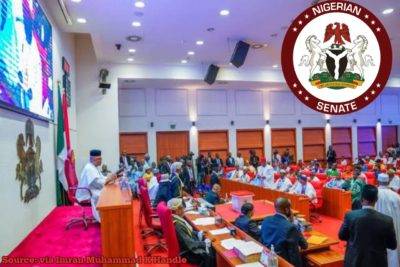The Nigerian Senate has affirmed that the minimum age requirement of 16 years for admission into universities will remain unchanged. The red chamber has clarified that any statements suggesting a potential increase of the age limit to 18 years were merely individual viewpoints and do not reflect an official policy. The Nigerian Senate has made it clear that any adjustments to the age limit, whether lowering or raising it, would necessitate proper legislative procedures.
The upper chamber has emphasized that changes to the existing age limit cannot be implemented based solely on individual comments or opinions. Such modifications would require a comprehensive legislative process, ensuring that any proposed amendments undergo thorough scrutiny, debate, and stakeholder consultations before being enacted into law. This stance underscores the Senate’s commitment to upholding due process and maintaining stability within the educational system.
Clarification from the Nigerian Senate Committee on Media and Public Affairs
Addressing the recent discussion surrounding the minimum age requirement for university admission, Adeyemi Adaramodu, the Chairman of the Senate Committee on Media and Public Affairs, provided crucial clarification during an interview with journalists yesterday. He emphasized that comments or proposals regarding age limits do not hold the same weight as established law.
Adaramodu stated unequivocally, “It’s not a law. By the time the Nigerian Senate resumes, whoever wants to bring that one out to make it a law, will now bring it, and then the procedures will take place.” His remarks underscored the need for due process in changing any existing regulations, ensuring that proper legislative channels are followed before any modifications can be implemented.
The Nigerian Senate: Minister’s Comment Sparked Debate
The recent debate surrounding the minimum age requirement for university admission in Nigeria was triggered by a statement made by Prof. Tahir Mamman, the Minister of Education. Last week, Mamman mentioned that the government is considering raising the minimum age for entering universities to 18 years old, sparking discussions and reactions across the nation.
However, the Nigerian Senate has swiftly clarified that any such proposal to change the existing age limit would need to navigate through the proper legislative channels. This process would involve public hearings, consultations with key stakeholders, and a thorough review to ensure that any potential changes align with the best interests of students, educational institutions, and the nation as a whole.
The Nigerian Senate: Legislative Process Requires Stakeholder Engagement
Sen. Adeyemi Adaramodu, the Chairman of the Senate Committee on Media and Public Affairs, emphasized the importance of adhering to due process in considering any potential changes to the minimum age limit for university admission. He stated that such proposals must be brought before the Senate in the form of a bill, after which a comprehensive public hearing will be conducted.
Adaramodu underscored the inclusive nature of the legislative process, saying, “All the stakeholders will sit down and talk about it. The parents, teachers, legislators, civil society organizations, even foreign organizations. We will sit down and talk. Even if they say that the minimum age should be 30 or 12, we will all discuss it at an open forum.” This approach ensures that diverse perspectives are considered, and any proposed changes are thoroughly deliberated upon by all relevant stakeholders before implementation.
The Nigerian Senate: Public Discourse and Transparency
The Nigerian Senate’s clarification on the minimum age requirement for university admission underscores the importance of public discourse and transparency in the decision-making process. Any potential changes to the existing age limit would involve extensive consultations with a wide range of relevant stakeholders, including parents, educators, civil society organizations, and international bodies.
By engaging in open discussions and considering diverse perspectives, the Nigerian Senate aims to ensure that any proposed policy changes are well-informed, thoroughly deliberated, and aligned with the best interests of students, educational institutions, and the nation as a whole. This approach not only promotes transparency but also ensures that any modifications to the age requirement are carefully weighed and tailored to meet the needs of Nigeria’s educational landscape.
The Nigerian Senate: Maintaining Stability and Continuity
Until a formal legislative process is initiated and completed, the current minimum age requirement of 16 years for university admission in Nigeria will remain in effect. This decision by the Senate provides much-needed stability and continuity within the educational system, allowing students, parents, and institutions to plan accordingly without disruptions or uncertainties.
However, the Nigerian Senate’s stance does not preclude potential future discussions and revisions to the age limit if deemed necessary through the proper channels. Any proposed changes will undergo rigorous scrutiny, public consultation, and careful consideration to ensure that they serve the best interests of Nigeria’s educational landscape and its students. This approach strikes a balance between maintaining stability and remaining open to adapting to evolving needs and circumstances within the country’s educational framework.
Table of Contents
Discover more from OGM News NG
Subscribe to get the latest posts sent to your email.














